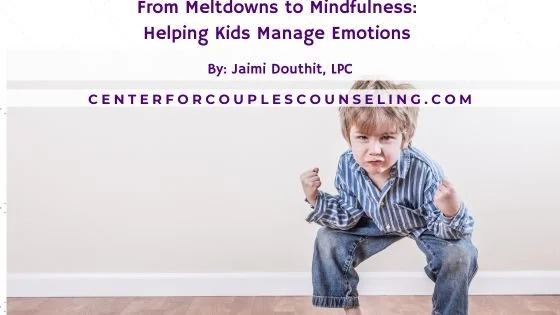From Meltdowns to Mindfulness: Helping Kids Manage Emotions
Watching your child have a meltdown can come with so many different valid emotions! These moments can feel embarrassing, hopeless, overwhelming and even bring forward a strong feeling of anger, just to name a few of those valid emotions. Most people you ask for help will have an answer of what worked for them but research has shown us some key points to utilize when helping children manage their big feelings.
Some details of how to handle meltdowns vary between ages of the children you are working with but let’s first go over what is helpful with any age:
-Being patient: It is important to understand that meltdowns are a normal part of development and how we handle them really matters! Ensuring that you and your partner are staying patient and mindful in how you are managing your child and their big feelings is a huge step forward in effectively managing a meltdown. There is no point in us also escalating - now we have to calm everyone down!
-Being proactive: It is invaluable to have a discussion with your partner ahead of time in how you are going to be proactive in managing these moments; what stressors do we know trigger our child and how do we address an issue before it escalates to an all out meltdown? Being on the same page with your partner about your parenting style and techniques can lead to a huge win for everyone involved.
-Setting Clear Expectations: When you set consistent and clear expectations for your children, it is far easier for them to understand what to expect from you. This is another area where consistency with your partner matters!
-Offering Positive Reinforcement: Don’t make your child guess if they did something well! It’s a big deal to offer them positive feedback when you see them handle something well or when they regulate their emotions effectively during a stressful situation. Just like with your partner, this feedback will be unique to your child so see what works for them! Watch your child’s face when you tell them you are proud of how they handled a hard situation. Experience that pride with them.
When we are working with specific ages, there are a handful of tools that are particularly effective:
-Toddlers (1-3 years): When working with toddlers aged 1-3 years, it is a big deal to focus on regulating your own emotions and staying calm, using simple language, keeping consistent routines in place, distracting and redirecting instead of using “no” frequently and always offering comfort to provide those amazing feelings of security. Toddlers are living a chaotic life trying to figure out all of these new experiences and learning opportunities. We know that if we have experienced harsh criticism for developmentally appropriate behaviors, our system goes on high alert when we see those behaviors in our children. “I couldn’t do that without consequence so you can’t do that without consequence - this behavior means danger!”. This is a great time to keep your check-ins with your partner up to date to ensure support where needed - the toddler life is a hard life!
-Preschoolers (3-5 years): As our littles grow into preschoolers, we want to prioritize guiding our children to a place of self-regulation so we are teaching them skills like taking deep breaths and counting to ten to manage a big feeling. We love a calming corner at this age! Offering choices, giving space but staying close and acknowledging feelings are significant ways to support your preschooler. Try, “I see you’re upset. Let’s talk about it” AFTER they are out of the big meltdown and their brain has had a chance to reconnect.
-School-aged Children (6-12 years): Our school-aged children are looking for more of what we have already set into play! They have far more exposure to the outside world now and luckily, we are focusing on expanding the things we have already invested in. We are continuing to teach and practice calming and relaxation techniques, discussing emotions and what support looks like, teaching and encouraging problem solving skills and compassionately helping them identify those triggers that they feel throw them into a meltdown. This is when we really explore what expressing feelings in a healthy way can look like.
–Teenagers (13+ years): You may think you know what someone wanting autonomy and independence looks like but you likely feel like an expert in it after the teenage years with your children! Teenagers can feel like an entirely different challenge but respect goes a long way during this time. It is important to respect our teenagers' space and always model and encourage emotional regulation and how to express feelings in a healthy way. They are still watching everything you do. It is invaluable to normalize open and honest communication with your teenager and encourage seeking professional help as needed.
You won’t be fully prepared to parent every developmental period, even those with multiple children experience firsts with their 4th or 5th child - the experience is still a unique one even if you think you’ve seen it all. It is okay for you to be learning how to parent your child as they are learning how to function at that age, in fact, communicating that you are trying to parent differently or be more supportive of them is a great way to normalize that honest communication we love to see. You don’t have to be perfect - you are human. It is better for our children to know they are allowed to make mistakes, learn to take accountability and how to do things differently next time than for them to feel that changing how they do things is impossible or shameful.
Remember, the goal isn't perfection—it's progress and connection. And you don’t have to do this on your own. We’re here to help! Embrace the journey of learning alongside your child and partner, and together, you'll navigate the path from meltdowns to mindfulness.
My name is Jaimi Douthit and I’m a Licensed Professional Counselor at the Center for Couples Counseling. I love working with couples and individuals who are ready and motivated to make changes in their lives and relationships, who can handle feedback and encouragement, and engage in using the tools I teach in therapy outside of the therapy room. At the Center for Couples Counseling, we specialize in couples therapy, infertility counseling, postpartum mood and anxiety disorders, self-care and burnout, and perfectionism. We help couples and individuals in the League City and Houston areas in person, and all residents of the State of Texas online. Call us at (832) 827-3288 to schedule a free phone consultation.
Begin Couples Therapy in League City, TX
We know relationships take a lot of hard work. But your relationship is important and deserves the effort. At Center for Couples Counseling we want to help you and your partner get back on the right track. To get started with in-person or online couples therapy follow these simple steps:
Meet with one of our skilled couples therapists
Begin to see positive changes in your relationship
Other Services Offered at Center for Couples Counseling
At the Center for Couples Counseling, we understand you or your relationship may be facing different challenges. To help you work on yourself and your relationship, our Texas practice offers individual therapy, infertility counseling, postpartum anxiety, and depression counseling, therapy for self-care and burnout, and therapy for perfectionism. For more about us check out our FAQs and blog!







